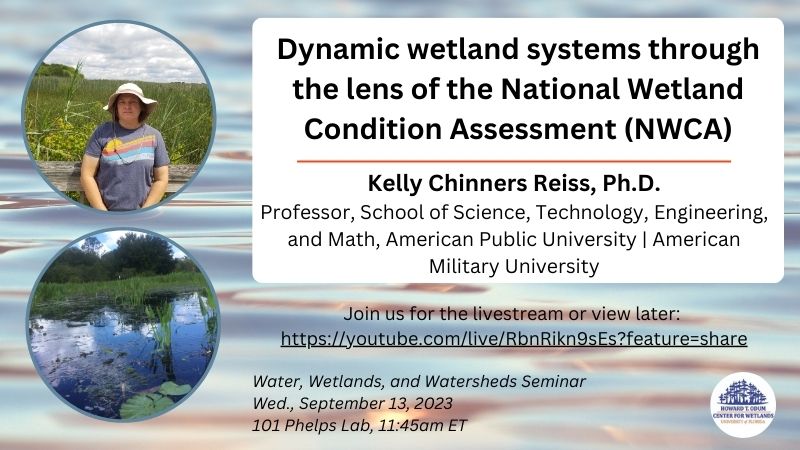
Kelly Chinners Reiss, Professor, School of Science, Technology, Engineering, and Math, American Public University
Join us for the livestream September 13th, 11:45am ET: https://youtube.com/live/01opwAz2W7Y?feature=share.
(Please visit our YouTube channel main page for the stream if there are any issues with the direct link.)
ABSTRACT
While the policy definition and the protection of wetlands remain cloudy as Waters of the United States (WOTUS), wetlands are widely recognized as contributing ecosystem services and providing undeniable benefits across local and regional landscapes. However, much remains unknown regarding the ecological condition of wetlands at the landscape scale. To better understand wetland health and stressors, the US Environmental Protection Agency (EPA) led National Wetland Condition Assessment (NWCA) provides data on chemical, physical, biological, and recreational indicators of wetland condition. Scheduled to repeat every five years, the NWCA survey was carried out in 2011, 2016, and 2021, targeting all tidal and nontidal wetland types spatially situated mainly within the conterminous US. Through a probability-based, statistically valid, random sampling design, the NWCA offers a unique dataset not only with a sizable site count (e.g., ~1,000 assessment areas per survey year) but also with repeat sampling of ~10% of assessment areas from survey to survey. Using the NWCA, trends detected in repeat field sampling and remote sensing present an opportunity to study drivers of wetland community structure and changes across time. Some unexpected findings in plant community similarity continue to lead to more research questions and other wonders.
BIO
Dr. Kelly Chinners Reiss is a wetland community ecologist interested in landscape connectivity. A Professor of Environmental Science, Policy, and Management, in the School of Science, Technology, Engineering, and Math (STEM) at American Public University (APU) and American Military University (AMU), collectively American Public University System (APUS), she serves as faculty co-advisor of the National Association of Environmental Professionals (NAEP) and The Wildlife Society (TWS) student chapters and co-leads the and the Water Testing and Awareness Project (WaterTAP). Dr. Reiss is a Certified Senior Ecologist through the Ecological Society of America (ESA) and has managed the Florida portion of the National Wetland Condition Assessment (NWCA) through the Howard T. Odum Center for Wetlands, University of Florida (UF) since its implementation in 2011. Her recent research interests involve indicators of wetland condition. Past projects have included geographically isolated wetlands, restored and enhanced wetlands, and springs; wetland mitigation banking; wetland biological indicators; and characterizing reference wetlands. Dr. Reiss received her BS in Forest Resources and Conservation (Institute of Food and Agricultural Sciences, UF), MS in Systems Ecology (Environmental Engineering Sciences [EES], UF), and PhD in Systems Ecology (EES, UF). She is a lifetime member of both the ESA and the Society of Wetland Scientists (SWS). She serves on the Stewardship Committee of the Barrington Land Conservation Trust and Chairs the Open Space Committee for the Town of Barrington.
POSTCARD
